[All links lead to Spanish language pages except when otherwise noted]
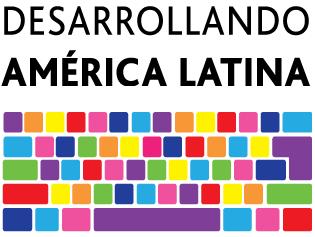 Previously we reported on [en] the ‘Developing Latin America’ competition (Desarrollando América Latina), or #DAL, a public hackathon that aims to create technological solutions to problems in education, security and public budget, in six countries in the region. Now it's time to report its results.
Previously we reported on [en] the ‘Developing Latin America’ competition (Desarrollando América Latina), or #DAL, a public hackathon that aims to create technological solutions to problems in education, security and public budget, in six countries in the region. Now it's time to report its results.
The Intelligent Citizen Foundation [en] (Fundación Ciudadano Inteligente), which organised the event, determined that there were local winners, in addition to the general and regional winners, so the competitiveness in each venue was an added ingredient to the challenge of managing to complete an interesting application based on existing open data, within the time limit.
CitiVox [en] and OpenDataMx talk about the event in Mexico:
participaron poco menos de 50 jóvenes, de varios estados de la república, desde Sonora hasta Oaxaca. Se formaron diez equipos que trabajaron en 30 horas en diversos temas, desde seguridad pública hasta la transparencia de la nómina estatal. Finalmente presentaron sus proyectos ante un jurado formado por Mónica Aspe (Coordinación de la Sociedad de la Información y el Conocimiento, SCT), Eric Gundersen (Seed Development) y Andrés Lajous (revista Nexos). Después de escuchar las presentaciones de los equipos y de deliberar se anunció que el segundo lugar sería para el proyecto Nuestra Info por su vanguardia y potencial para presentar datos públicos difíciles de accesar. El primer lugar fue para Xmatch por hacer accesible la información y la visualización comparativa de datos en mapas.
Fayerwayer did the same on the Chilean side:
En Chile, el evento […] se llevó a cabo en la Universidad Adolfo Ibáñez, concluyendo con la presentación de nueve proyectos de Santiago y cuatro de Temuco. […] Los tres primeros lugares fueron:
- Proyecto “Escuela Popular”: desarrollado por los ucranianos residentes en Chile Oleh Burkhay y Nadiia Vasylchenko, se trata de un portal que permita tener información actualizada y profunda de los colegios y escuelas del país. […] permite a las personas entregar puntos según diferentes indicadores a cada colegio, y comentar respecto al mismo, entregando mejor información a los padres que estén buscando la mejor alternativa.
- Proyecto “Presupuéstate”: […] busca proyectar cuánto necesitan ahorrar a largo plazo los padres de un estudiante para pagar la universidad del hijo. La aplicación hace el cálculo según el sueldo de la persona, mostrando una proyección de los aranceles según carrera. También hace recomendaciones de qué colegios pueden servirle al alumno para entrar a la carrera que quiere, según los puntajes PSU [Prueba de Selección Universitaria] de corte de cada carrera.
- Proyecto “Punto Seguro”: es una plataforma donde las personas de un barrio pueden marcar en el mapa un lugar de conflicto (donde ocurren robos, violencia, etc) y generar una discusión con los vecinos donde dar ideas sobre cómo combatir esa situación (instalar luminarias, organizar sistemas de alarma entre vecinos, etc).
- “Public School” project (Proyecto “Escuela Popular”): Developed by Ukrainians Oleh Burkhay and Nadiia Vasylchenko living in Chile, it is a portal that allows accurate and detailed information about schools in the country. It allows people to give points to schools regarding different categories and comment about them, thus giving better information to parents who are looking for the best option.
- “Budget yourself” project (Proyecto “Presupuéstate”): It sought to project how much parents would need to save in the long term to be able to pay for their child to go to university. The application made a calculation based on a person's salary, showing a projection of different tariffs relating to different careers. It also made recommendations about which schools could help the students enter the degree path they desire, according to the University Selection Test grades taken from each degree.
- “Safe Point” project (Proyecto “Punto Seguro”): A platform where people from a neighbourhood can mark a conflict area (where robberies, violence e.t.c occur) on a map and create discussions with neighbours, in which they exchange ideas about how to combat the situation (install streetlamps, organise alarm systems amongst neighbours e.t.c).
In Perú, Escuelab reports about the winners from the 12 participating groups (Disclaimer: I [Juan Arellano] was part of the DAL panel in Lima):
El jurado otorgó el primer lugar al grupo #OTA por el proyecto Quiero Ir! que mediante un punto de inicio indicado manualmente o usando el GPS muestra en un mapa las rutas (líneas de transporte público) que llevan al usuario hasta el destino seleccionado. La aplicación ofrece además información referente a la empresa de transporte (número de ruta, distrito inicial, distrito final, etc) así como una foto referencial de la unidad.
En segundo lugar se eligió al equipo SEUSS. Su aplicación presupuestando.pe, brinda información de manera dinámica acerca de los indicadores presupuestales de los gobiernos regionales y locales proporcionando un fácil acceso a la información incentivando la participación ciudadana. (Presupuesto a nivel nacional). El proyecto se puede ver aquí: http://bibliotecuss.iideasperu.org/presupuestando/
En tercer lugar se eligió a ¡Salvemos las Huacas!, una plataforma web de mapeo ciudadano orientada a la defensa, conservación y protección del patrimonio arqueológico ante la amenaza del desborde urbano en nuestra ciudad.
The panel awarded first place to the #OTA group for the Quiero Ir! (I want to go!) project that, by means of a manually- or GPS-inputted starting point, mapped the (public transport) routes that would take the user to their selected destination. The application also offered information about the route (route number, starting point, final destination, e.t.c) as well as a reference photo of the vehicle.
The SEUSS team was given second place. Its presupuestando.pe application offers information in a dynamic way about the budgetry indicators of the regional and local governments, providing easy access to the information and encouraging citizen participation. (Budget at national level). The project can be seen here: http://bibliotecuss.iideasperu.org/presupuestando.
Third place was given to ¡Salvemos las Huacas! (We save the tombs), a web platform for a citizen map orientated towards the defence, conservation and protection of our archaeological heritage against the threat of urban overflow in our city.
In Argentina the winning projects were: 1- Del boletin (The Bulletin), 2- Datos Universitarios (University Data) and 3- Qué Sabemos de? (What do we know about…). In Brazil the Onde Acontece? (Where does it happen) project is reported to have won; and in Uruguay the following projects won: 1- Gobierno transparente (Transparent Government), 2- Reporte de Mapas (Map Report), 3- Moña Azul (Blue Bow). Finally the #DAL organisers announced the regional level winners:
1. Brasil – Onde Acontece. Team: São Paulo Perl Mongers. Team Leader: Thaigo Rondon.
2. Chile – Escuela Popular. Team: Oleyna. Team leader: Oleh Burkay.
3. Uruguay – Moña Azul. Team: Moñita Azul. Team leader: Fernando Briano.
DAL also added that “The developers, designers, engineers, professionals from the most diverse areas, gave a lesson to the world. Boundaries do not exist when it comes to solving real problems for our towns, nationalities don't exist when it comes to trying to solve problems that bring all Latin Americans together.”
Some of the developers that took part in the competition published their thoughts on their blogs. For example, Uruguayan developer Francisco Castro comments about the project he collaborated on:
Estuve participando en un grupo que busca acceder a la gente de “a pie” la información del parlamento. Datos interesantes, como las asistencias, los proyectos que presenta cada parlamentario; tanto los gastos suntuosos, como los pedidos de informes que estos parlamentarios realizan a las diversas dependencias del estado; … Transparencia. Darle al público también la posibilidad de opinar al respecto de cada asunto, de que la gente pueda indicar qué temas le interesan, y así informarse cada vez que se presenten proyectos, notas, etc… al respecto.
Sylvia, from the blog El mundo frente al mar, is another Uruguayan developer that took part in the competition. Out of all the things that the experience has given her, she mentions:
- Todas las pilas para aprender rápido y bien otros lenguajes como Java y Python. Yo sólo soy estudiante de UTU y mi intención al ir fue la de aprender y no la de ganar. Ahora, que voy a tener un premio entre manos, las ganas de superarme más allá del curso que hago son muy fuertes.
- Darse cuenta que con la informática también se puede ayudar en problemas diarios y en temas sociales. Sólo es cuestión de pensarlo y encontrarle la vuelta.
Also, Fernando Briano, another Uruguayan, in his blog Picando Código talks about his experience in #DAL and he concludes:
Me alegro de haber podido aportar mi granito de arena en algo mucho más grande que cada uno de los participantes, pero realizado con el trabajo colaborativo de todos.[…] Sabemos que estos proyectos, así como los proyectos de otros países, se segurián desarrollando. Próximamente habrán más hackatones de este estilo, donde espero ver más gente participando. Personalmente hoy estuve trabajando un poco en procesamiento de datos xls, ods y Google docs, y sé que Juan Manuel iba a mirar cosas de OCR para PDF y Fran estuvo mirando DJango (por influencia directa del evento). Sé que los demás equipos también piensan seguir el desarrollo, lo que marca el inicio de esta nueva etapa que comentaba. No hay que perder el impulso
This competition has, in equal measures, served to encourage the idea of hackathons [en] and public hackers in the region and to organise the community of people from diverse disciplines with experience in the use and exploitation of open data bases.
This might be a good starting point both to generate similar replicas or more ambitious activities from civil society organisations interested in these issues, as well as for the simple spread of the concept of open data, e-government and the social use of IT amongst the developers of the region and others who are interested. Hopefully these types of initiatives will become widespread throughout all Latin American countries.

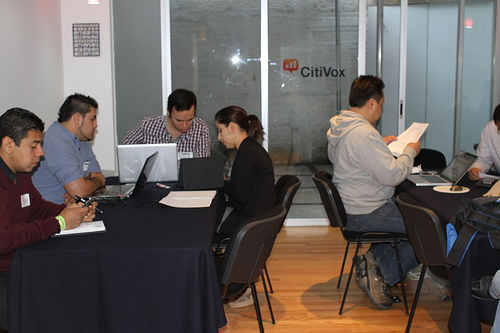
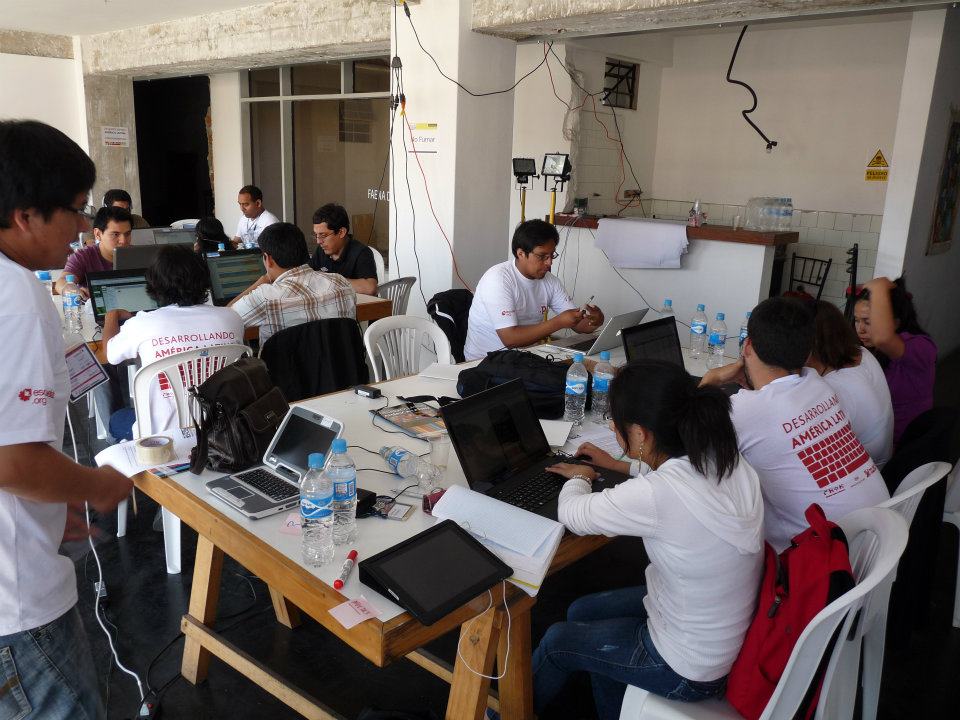
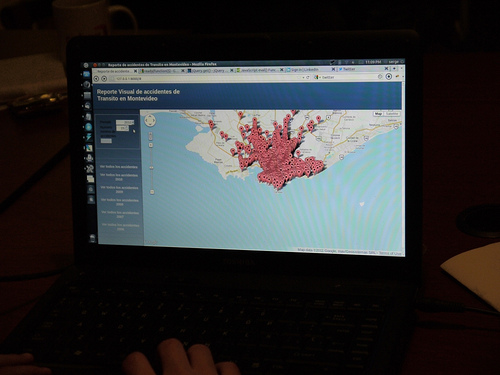
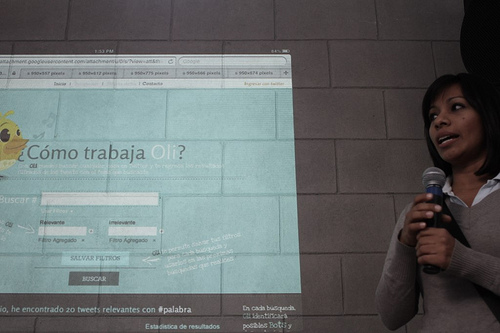







2 comments